 As we continue our journey into this sleep series (click here for Part 1 or Part 2), we will now take a look at how Ayurveda classifies sleep disorders. Ayurveda is based on the idea that we are all individuals with specific, unique needs. What may be medicine to one, may be poison to another. Similarly, each unique individual will have unique causes and symptoms for their sleep disorder. Therefore each person’s condition will require different treatment to get to the specific root cause of the disorder.
As we continue our journey into this sleep series (click here for Part 1 or Part 2), we will now take a look at how Ayurveda classifies sleep disorders. Ayurveda is based on the idea that we are all individuals with specific, unique needs. What may be medicine to one, may be poison to another. Similarly, each unique individual will have unique causes and symptoms for their sleep disorder. Therefore each person’s condition will require different treatment to get to the specific root cause of the disorder.
It is always vital to treat the individual and not the sleep disorder itself. Of course there are universal herbs and remedies to utilize as a complimentary treatment; however, if you do not treat the root cause of the disorder, the herbs will merely pacify the symptoms without ever touching the disorder. This leaves one continuously dependent on the herbs, which tend to become less effective as the disorder strengthens with time. In order to discover the root cause, an Individual Ayurvedic Consultation may be needed. This will allow you the means to evaluate your specific disorder, peeling apart the layers and consequently discover ways to remove the cause(s).
Although the causes will vary from individual to individual, we can at least begin to list the symptoms and therefore discover the classification of the sleep disorder according to the Vata, Pitta, Kapha paradigm. By reading these next sections, you can find out how Ayurveda will classify your specific sleep condition and then find the best sleep treatment options for you. I will share with you an introduction into the treatment protocol for each classified sleep disorder in the next (and final) section of this series.
Vata Sleep Disorder:
A Vata sleep disorder tends to be the most common of the three. This is largely because a sleep disorder often is a disruption in the nervous system; and according to Ayurveda the nervous system is directly related to Vata dosha. Vata is the biological, energetic force that is manifested of Air and Space, the same elements that typically will be distorted in a sleep disorder.
Increased Vata will cause excessive qualities of:
- Mobile, such as a restless mind
- Dryness, such as dry skin or constipation
- Lightness, such as being underweight
- Clearness, such as spacey, forgetful and hard to concentrate
- Coldness, such as cold hands and feet
- Irregularity and fluctuation, such as an irregular routine of sleep and eating
General Vata disorder symptoms include:
- Gas, bloating and cramping after food
- Constipation
- Increased or irregular heart beat
- Restless thoughts
- Dizziness
- Fluctuating emotions and mood
- Oversensitive mind and nervous system
- Dry, itchy, flaky skin
- Dry mouth and throat
A Vata sleep disorder tends to stem from emotional imbalances including excessive anxiety, worry, fear, loneliness and an overactive, restless mind. Eventually, all these increased Vata qualities get lodged into the mind and the nervous system, creating the sleep disturbances. Here are some signs to look out for in a Vata Sleep Disorder.
Vata Sleep Disorder symptoms:
- Inability to fall asleep when desired; typically caused by a restless mind, worry, anxiety or loneliness
- Waking-up multiple times throughout the night, especially between 2-6am
- Extremely light sleep; even soft noises will wake one up
- Sleep issues worsen with hunger; eating food in the middle of the night helps one to fall back asleep
- Dreams of falling, being chased and overall fear/anxiety based
- Disorder is increased by feelings of coldness (i.e. cold room, cold hands and feet)
- Disorder worsens in the fall and winter months
- Once lack of sleep occurs, typical symptoms the following day include spaciness, dizziness, clumsiness, light-headed, low blood pressure, increased coldness, anxiety and restless mind, inability to concentrate
Pitta Sleep Disorder:
Pitta is the biological energetic force that is governed mainly by the Fire element in the body. If one’s Pitta is increased for a long period, it eventually make its way into the nervous system and mind, consequently wreaking havoc on one’s sleep cycle.
Increased Pitta will cause excessive qualities of:
- Heat, such as night sweats, hot flashes and hot temper
- Sour, such as hyperacidity, sour stomach and sour emotions
- Lightness, such as low blood sugar
- Sharpness, such as sharp temper, intense appetite and “cranky hunger”
- Oiliness, such as acne and excessive sweating
- Spreading, such as rash, hives or other skin conditions
General Pitta disorder symptoms include:
- Loose and frequent stools
- Excessive heat in the body
- Inflammation
- Pink flushed face
- High blood pressure (stress related)
- Hyper-metabolism
Pitta imbalances tend to show mental/emotional imbalances such as anger, irritability, hot temper, over ambition, workaholic tendencies, a perfectionist mindset and excessive criticism and judgment, even to oneself. If high Pitta is the cause of the disorder, the sleep disorder symptoms will vary a bit from the Vata Sleep Disorder, and therefore treatment will vary as well. Here are some common signs to look for.
Pitta Sleep Disorder symptoms:
- Falling asleep easily, but waking up in the middle of the night with difficulty falling back asleep
- Thoughts of work and continuous problem solving keeping you awake
- Boost of energy (second wind) around 10pm
- Late night munchies around 10 pm; craving salty, sweet or spicy foods
- Heartburn or hyperacidity, keeping one awake
- Dreams of fire, anger, blood, fighting, arguing or working
- Disorder is increased by heat
- Disorder worsens in the summer season
- Once lack of sleep occurs, typical symptoms the following day include increased irritability, large appetite, excessive sweating, temporal headache and heat
Kapha Sleep Disorder:
Kapha dosha is the biological energetic mechanism related to the Earth and Water elements. If one experiences a long-term Kapha imbalance, it eventually will begin to invade the mind and the nervous system, causing sleep disturbances. Since Kapha is heavy, dull and slow by nature, a Kapha sleep disorder may look quite opposite of the two disorders mentioned prior.
Increased Kapha will cause excessive qualities of:
- Heaviness, such as excessive weight
- Slowness, such as slow moving, slow talking
- Dullness, such as a dull/foggy mind
- Oiliness, such as oily skin and hair
- Cool, such as cold hands and feet
- Slimy/Sticky, such as excessive phlegm
- Liquid, such as edema, water retention or swelling
General Kapha disorder symptoms include:
- Heaviness and/or sleepy after food
- A dull appetite, meals skipped often without notice
- Excessive or thick saliva
- Excessive weight; easy to gain, hard to lose
- Prone to daytime naps
- Sadness and depression, cries easily
- Hard to motivate
- Tendency toward laziness and lethargy
Kapha emotional imbalances may cause a Kapha type sleep disorder and will typically manifest as depression, sadness, greed, attachment and inability to change. With such different symptoms, the treatment protocol will vary quite a bit. Here are some come signs to look for in a Kapha Sleep Disorder.
General Kapha disorder symptoms include:
- Excessive sleeping, may sleep 10-12 hours a night if permitted
- Extreme difficulty upon awakening
- Wakes up groggy, lethargic and unmotivated
- Mind is slow going and dull in the morning
- Wakes up with no hunger
- Dreams of water, nature, crying and sadness
- Heavy sleeper; can sleep through anything!
- Hard to awaken by others
- Once sleep disturbance occurs, typical symptoms the following day include dull mind, slow reflexes, inability to think or concentrate, sadness, crying, depression and extreme lack of motivation
Conclusion:
Now that you have an idea of the 3 main types of sleep disorders, you must now find out which type your disorder falls into. Of course, this is not a black and white issue, so you may find your symptoms falling into more than one category. In this case, just think of the most common symptoms that occur and then add up how many symptoms fall under each category. Whichever category has the most tallies, you can assume this is the disorder your sleep issue will fall into. If there is many tallies in multiple categories, this most likely means that more than one dosha is at play, and the treatment will need to be even more specific than you can get reading an article. If this is the case, it may be best to get an Individual Ayurvedic Consultation to get the support needed.
Read on for the Ayurvedic treatment to these 3 types of sleep disorders!

